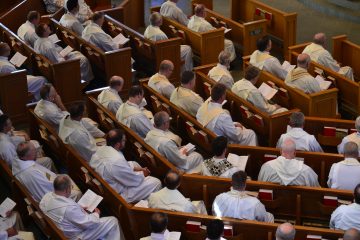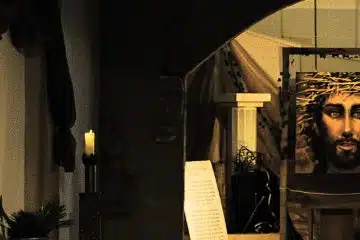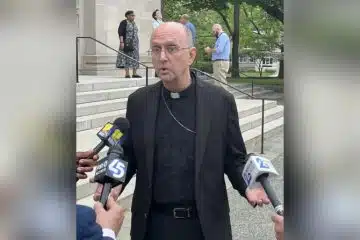Distress remains over ‘show me your papers’ part of immigration ruling
June 26, 2012
Catholic News Service
WASHINGTON — In what one observer called “the judicial equivalent of white smoke,” immigration advocates were largely happy with the June 25 Supreme Court ruling that struck down three key provisions of Arizona’s own immigration law.
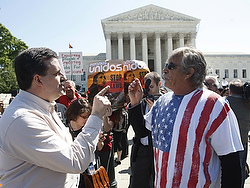
However, they voiced distress over the one part of the law the high court kept intact: the “show me your papers” provision.
Because of “certain limitations,” the court said, such checks do not “interfere with the federal immigration scheme.” However, the decision also said the provision would face further scrutiny and could later be found unconstitutional.
“We are encouraged that the court did not rule it (the provision) constitutional,” said Archbishop Jose H. Gomez of Los Angeles, chairman of the U.S. bishops’ Committee on Migration, in a statement. “Implementation of this provision could lead to the separation of families and undermine the church’s ability to minister to the immigrant population.”
Archbishop Gomez said, “The court’s decision to strike down the other provisions of the Arizona law reaffirms the strong role of the federal government in regulating immigration.”
With regard to the court allowing checks of people’s papers, he added: “We stand in solidarity with our brother bishops in Arizona, as they prepare to respond to the implementation of this provision and its potential human consequences.”
The archbishop said the U.S. bishops would ask state legislators to “pursue humane reform on the federal level” rather than the state level. “Humane enforcement of our nation’s laws are part of any solution, but enforcement by itself, unjustly administered, only leads to abuses and family breakdown.”
Arizona’s Catholic bishops, in a separate statement June 25, said they believed the “show me your papers” provision “will not enhance security, benefit the economy of our state, or foster its well-being. Rather, this provision might separate families, create the possibility of racial profiling even if unintended by the law, heighten fear in the immigrant community, jeopardize community policing, and not fix the federal immigration policy which many across the political spectrum have said is broken.”
They added the Supreme Court’s reversal of the other three provisions of the law “substantially upheld” the view that the state law “is not good for our state and not good law.”
The Arizona bishops said there were convinced that “immigration policy is the responsibility of the federal government assuring that there is no great discrepancy throughout the nation on how immigrants are treated.”
Angelica Salas, executive director for the Coalition for Humane Immigrant Rights of Los Angeles, said the ruling “marks a dark day for justice in the history of the United States of America. In one sweep, the Supreme Court has sided with Arizona and allowed racial profiling as an acceptable law enforcement tool.”
“The court challenges will continue,” Salas said, “as we are certain racial profiling is unconstitutional.” She added in her June 25 statement that the White House should work with Congress to protect “young people and students who are American in all but paperwork.”
“The judicial equivalent of white smoke has risen — the Supreme Court has ruled,” said a statement by ImmigrationWorks USA president Tamar Jacoby. “Many were expecting a tough decision, opening the floodgates to states’ rights, and the majority opinion is surprising — it leaves less room than many anticipated for state immigration enforcement.”
While Jacoby made clear she disagreed with the majority opinion upholding the “show me your papers” provision, “even that part of the opinion is tenuous, and it’s far from certain what will happen next,” she said.
“Fears that the ruling will open the door to a rash of Arizona copycat measures may be exaggerated,” she said, adding, “The fight over who should make immigration law, Washington or the states, is far from over. But today’s ruling — consistent with the mood in many states — is a stunning reversal of recent trends.”
Lawmakers were quick to weigh in.
The ruling makes certain “immigration is in the exclusive purview of the federal government,” said a statement from Rep. Charles Gonzalez, D-Texas, chairman of the Congressional Hispanic Caucus. “Now, more than ever, it is clear that our country needs real, permanent solutions and that Congress must pass comprehensive immigration reform. When three out of four provisions of a state’s law are struck down, it obviously can’t be viewed as a victory for the state. Nor can an unconstitutional law be used a model for the nation.”
Rep. Ed Pastor, D-Ariz., decried the court’s upholding of “show me your papers,” saying that it “will result in the harassment of those here legally, including tourists, legal immigrants and even U.S. citizens and place significant burdens on federal agencies by diverting resources away from dangerous criminals and other high-priority individuals.”
“Letting stand a provision that requires police to check someone’s status because they ‘suspect’ them of coming into the country illegally is preposterous. Your grandmother or little brother can be walking to the corner grocery story and be stopped and detained if they look ‘suspicious,'” said Ruben Hinojosa, D-Texas. “Our Constitution must guarantee that all people — no matter where they were born or what color skin they have are afforded the same basic rights and treated equally.”
But Rep. Duncan Hunter, R-Calif., stated that “inaction by the federal government has forced Arizona and other states to confront the enormous strain on resources and finances that is attributed to illegal immigration.
“The federal government can put an end to all this uncertainty by enforcing the law — at the border and in the workplace.” Hunter added, “Arizona had no other option and the state did what it needed to do for the protection of its citizens.”
Outside the Supreme Court building as the decision was delivered, people with an interest in this and other rulings delivered by the court voiced their views.
“Of course I’m disappointed with the ruling, but, you know, this is just the beginning, because different states are coming up with their own laws to protect themselves and it will be a problem across the country in every state until this problem is solved nationally,” said Ronald Kirby, 67, who identified himself as a tea party member but was not with any group.
“I don’t agree with stopping people randomly, but if I get pulled over, of course I’ll have my identification with me,” Kirby told Catholic News Service. “Everybody should, and I would expect you to.”
“It would be a mess if we all had to prove our ancestry. You really want to impose racial profiling to check if we’re immigrants, then American Indians are going to be the only ones left here,” said Jerome McNeil, a retiree.
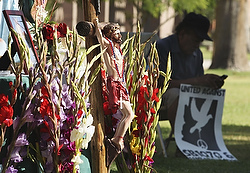
He added that “through no fault of my own” his ancestors were brought to this country “as slaves. And now you’re going to profile minorities that didn’t want to be here in the first place? Well I’m here now, and I expect equal justice under the law.”




